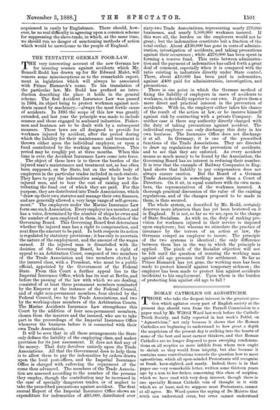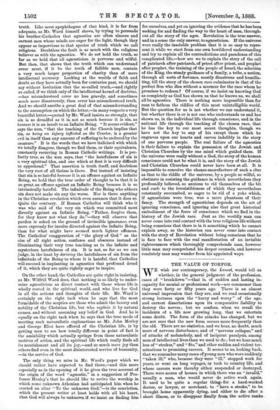ROMAN CATHOLICS ON AGNOSTICISM.
THOSE who take the deepest interest in the greatest ques- tion which agitates every part of English society at the present day, should turn from the Parnell Commission to a paper read by Mr. Wilfrid Ward last week before the Catholic Truth Society, and fully reported in last week's Tablet, on " Agnosticism," not only because it shows that the Roman Catholics are beginning to understand to how great a depth the scepticism of the present day is striking into the hearts of some of the best and most earnest thinkers, and that Roman Catholics are no longer disposed to pass sweeping condemna- tions on all sceptics as mere infidels from whom men ought to shrink as they would from iniquity, but also because it contains some contributions towards the question how to meet agnosticism, which all open-minded Protestants will recognise as frank, keen-sighted, and manly. Indeed, there is in that paper one very remarkable letter, written some thirteen years ago by a nun to her father, concerning this class of sceptics, which we have read with very deep interest, though there is one specially Roman Catholic vein of thought in it with which we at least, and we suppose most Protestants, cannot at all agree. Mr. Ward quotes the saying of De Maistre that truth can understand error, but error cannot understand troth. Like most apophthegms of that kind, it is far from adequate, as Mr. Ward himself shows, by trying to persuade his brother-Catholics that agnostics are often sincere and earnest men whose minds are eager for the light, though they appear so impervious to that species of truth which we call religious. Doubtless the fault is as much with the religious believer as with the agnostics. We do not hold the truth, so far as we hold that all agnosticism is perverse and wilful. But then, that shows that the truth which can understand error must, if it be the truth of fallible men, contain a very much larger proportion of charity than of mere intellectual accuracy. Looking at the worlds of faith and doubt as they have actually been for centuries past, we should say without hesitation that the so-called truth,—and rightly so called, if we think only of the intellectual kernel of doctrine, has misunderstood error no less gravely, and sometimes much more disastrously, than error has misunderstood truth. And we should ascribe a great deal of that misunderstanding to the assumption on which the letter,—in many respects a very beautiful letter,—quoted by Mr. Ward insists so strongly, that sin is so dreadful as it is, not so much because it is sin, as because it is an insult to an -infinite Being. "It seems evident," says the nun, "that the teaching of the Church implies that sin, as being an injury inflicted on the Creator, is a greater evil in itself than any amount of suffering to be endured by the creature." It is the words that we have italicised with which we totally disagree, though we find them, or their equivalents, constantly recurring in Roman Catholic writings It is per. featly true, as the nun says, that " the hatefulness of sin is a very spiritual idea, and one which at first it is very difficult to apprehend." That assertion is truth itself, and doubtless the very root of all theism is there. But instead of insisting that sin is so hateful because it is an offence against an Infinite Being, we hold that the true order of thought to be that it is so great an offence against an Infinite Being because it is so intrinsically hatefuL The infinitude of the Being who abhors sin does not make sin any the worse. Nor is there anything in the Christian revelation which even assumes that it does so. Quite the contrary. If Roman Catholics will think who it was who said of the very sin which was committed most directly against an Infinite Being, "Father, forgive them, for they know not what they do,"—they will observe that pardon is asked on the ground of invincible ignorance, even more expressly for insults directed against the Tnfinite Being, than for what might have seemed much lighter offences. The Catholics' exaggeration of "the glory of God" as the aim of all right action, confuses and obscures instead of illuminating their very true teaching as to the infinite and mysterious hatefulness of sin. It is not, so far as we can judge, in the least by deriving the hatefulness of sin from the infinitude of the Being to whom it is hateful, that Catholics will succeed in implanting in agnostics that profound dread of it, which they are quite rightly eager to inspire.
On the other hand, the Catholics are quite right in insisting, as Mr. Wilfrid Ward does, that nothing is so likely to under- mine agnosticism as direct contact with those whose life is wholly rooted in the spiritual world, and who live for God in all the actions and thoughts of their life. Mr. Ward is certainly on the right tack when he says that the most formidable of the sceptics are those who admit the beauty and nobility of the Christian life, but who explain it by natural causes, and without assuming any belief in God. And he is equally on the right tack when he says that the true mode of meeting such naturalistic explanations as Mr. John Morley and George Eliot have offered of the Christian life, is by getting men to see how totally different in point of fact is the amiability which actually springs from those naturalistic motives of action, and the spiritual life which really finds all its nourishment and all its joy,—and so much more joy than others find even in the most disinterested service of humanity, —in the service of God.
The only thing we miss in Mr. Ward's paper which we should rather have expected to find there,—and this more especially as in the opening of it he gives the true account of the origin of the word " agnostic," in a suggestion of Pro- fessor Huxley's that he should like to revive the worship in which some unknown Athenian had anticipated him when he erected an altar " To the unknown God,"—is the conviction, which the present writer at least holds with all his heart, that God will always be unknown if we insist on finding him
for ourselves, and yet on ignoring the evidence that he has been seeking for and finding the way to the heart of man, through- out all the story of the ages. Revelation is the true answer, and in a sense the only answer, to agnosticism. If the universe were really the insoluble problem that it is so easy to repre- sent it while we start from our awn bewildered understanding and try to explain all the contradictions and paradoxes of this complicated life,—how are we to explain the story of the call of patriarch after patriarch, of priest after priest, and prophet after prophet, the training of the people of Israel, the selection of the King, the steady guidance of a family, a tribe, a nation, through all sorts of fortunes, mostly disastrous and humilia- ting, till the story of the chosen race culminates in that of the perfect Son who dies without a murmur for the race whom he promises to redeem P Of course, if we insist on knowing God as completely as God has shown us that he knows us, we shall all be agnostics. There is nothing more impossible than for man to fathom the riddles of this most unintelligible world. But the question for us is not whether we can understand it, but whether there is or is not one who understands us and has shown us, in the individual life through conscience, and in the national life through the teaching of the chosen race, that he has the key to our most secret thoughts, though we have not the key to any of his except those which he engraves upon our hearts and carves indelibly in the story of one perverse people. The real failure of the agnostics is their failure to explain the possession of the Jewish and Christian Churches by the one mind which guided them. If the universe were really without a God, the story of the human conscience could not be what it is, and the story of the Jewish and Christian Churches could never have been at all. It is impossible to conceive the chance-manufacture of such a clue as that to the riddle of the universe, by a people so wilful, so obstinate in resisting the guidance in which nevertheless they profoundly believed, so anxious to rid themselves of the bit and curb to the irresistibleness of which they nevertheless constantly succumbed, so eager to be rid of a yoke which,, if agnosticism were true, was a mere phantasm of their fancy. The strength of agnosticism depends on the art of ignoring conscience, and ignoring also that great historical embodiment of the force of conscience which we find in the history of the Jewish race. Just as the worldly man can never come into real contact with the true religious life without being conscious that there is in it something which he cannot explain away, so the historian can never come into contact with the story of Revelation without being conscious that he is face to face with the real manifestation of an invisible righteousness which thoroughly comprehends man, however little man may comprehend his deeper counsels, and however resolutely man may wander from his appointed ways.



















































 Previous page
Previous page